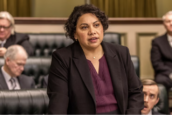
Statement on global economy delivered to Bolivia
In La Paz, an ecumenical delegation delivered to Bolivian government officials a statement on ethical principles for a new global economic system. The statement was received by Bolivian minister of the presidency Juan Ramon Quintana at the government palace on January 9.
The ecumenical delegation was led by the Rev. Dr Walter Altmann, a Brazilian pastor and moderator of the World Council of Churches (WCC) Central Committee.
“We share the commitment to work in favour of the future of humankind,” said Quintana while receiving the document titled “São Paulo Statement: International Financial Transformation for the Economy of Life”. “We have to work on a common agenda of cooperation,” he added.
The statement was jointly produced by the participants of a conference in 2012, promoted by the WCC, the World Communion of Reformed Churches and the Council for World Mission in Guarulhos, Brazil.
Speaking to the delegates, Quintana stressed the importance of working in partnership with different global actors. “Churches can be very effective in sharing and promoting gifts that encourage the good living of all people. We work to defend and promote peoples’ dignity, which is also one of your mandates,” Quintana said.
Being a country struggling to elevate its economy, Bolivia is a key participant in the debate on development, especially initiated by the United Nations. The country is now led by its first indigenous president, Evo Morales, working on implementing balance within power structures, introducing a process for fair distribution of the natural resources.
The delegation also met with Ambassador Fernando Huanacuni, vice-minister for interreligious affairs at the Ministry of External Affairs in Bolivia. In the meeting, Huanacuni expressed appreciation for the statement.
“This document can be an important piece in the upcoming dialogue among different segments of our society”, he said. The ambassador also received a copy of the regional ecumenical proposal for the establishment of an agency of cooperation under the Union of South American Nations.
Government’s role in promoting an economy of life
Humberto Martin Shikiya, who is among those who have drafted the proposal, said, “The Bolivian government can play a decisive role in the debate about the concept of development taking place between the Community of Latin American and Caribbean States and the European Union.”
Martin, a delegate, is executive director of the Regional Ecumenical Centre for Advisory and Service (CREAS), member organisation of the ACT Alliance.
“In the ecumenical movement we are advocating for a wider understanding of development inspired by the concept of good living,” Martin said. “The Andean concept of Sumak Kawsay is more holistic than the current basic idea of development.”
Martin was referring to the expression Sumak Kawsay, from the indigenous people of Quichua, which means “good life”.
The WCC Central Committee moderator Altmann shared his views about possible avenues of cooperation among churches and governments. “Most of the leaders currently in charge in Latin America once took part in processes promoted by the civil society,” said Altmann. He said that such process include the “World Social Forum and the People’s Summit, which are spaces where we are present side by side with other civil society movements”.
While explaining to the ambassador the scope of action for the ecumenical movement, Altmann mentioned work of the WCC and the ACT Alliance. “The cooperation between these two organisations is a concrete example of the synergy between spirituality and action,” he said.
In the meeting, human rights and environmental issues were discussed. Altmann also spoke about work of the WCC’s Ecumenical Water Network.
The delegation included Bishop Javier Rojas Terán of the Evangelical Methodist Church of Bolivia (IEMB), Caterina Bain, CREAS’s deputy director, Ana Maria Guzmán, responsible for public relations at the IEMB, and Dr Marcelo Schneider, the WCC’s communications liaison for Latin America.
The series of meetings in Bolivia are part of a regional ecumenical advocacy initiative, a follow up to the process which led to the development of the “São Paulo Statement”.
In October 2012, the Argentinean chancellery received another statement by the ecumenical delegation comprised of representatives from the WCC, the Latin American Council of Churches (CLAI), the Alliance of Presbyterian and Reformed Churches in Latin America (AIPRAL), the World Association for Christian Communication and the Latin American and Caribbean Agency of Communication (ALC).
Read also:
Ecumenical delegation presents statement on global economy to Argentina (WCC news release of November 2, 2012)
Read full text of the São Paulo Statement




























































